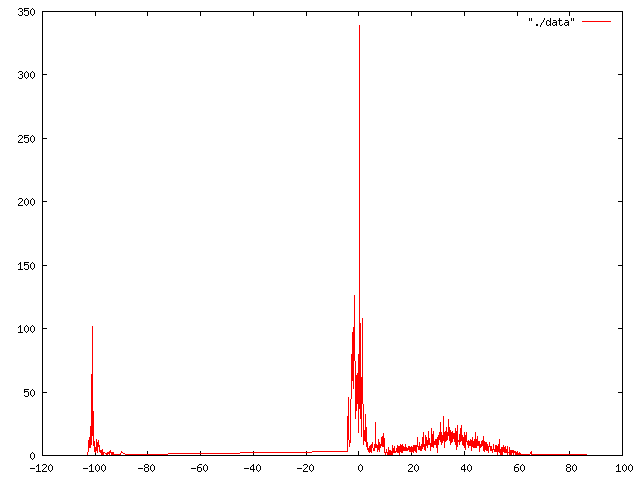Here's something simple that I never thought of - props to my workmate Tom for coming up with this.

This is a gnuplot graph of our SpamAssassin scores. The code used to generate it is on the bottom of the SpamAssassin notes page at the WLUG wiki.
The grouping around -100 is caused by the whitelist rule, which scores messages down 100 points (ensuring they are never marked as spam). Usefully, this rule doesn't count towards the threshold needed to be reached before a message is learnt as ham by the Bayesian categoriser.
We seem to have a reasonably normal distribution of good mail, between about -5 and +5, and a reasonably normal distribution of spam, between 10 and 60. This means our filter is working really well. What I took from this, is that it was safe to up the ham learning threshold - it defaults to -0.1, but I've set ours to 1, as we have a lot of rules that score all messages up quite equally.
Also useful is sa-stats.pl, which generates a summary table of how often rules were hit on messages that were either marked as ham or spam. As of today:
TOP SPAM RULES FIRED ———————————————————————- RANK RULE NAME COUNT %OFMAIL %OFSPAM %OFHAM ———————————————————————- 1 RAZOR2_CHECK 153 38.65 76.50 1.00 2 BAYES_99 150 37.41 75.00 0.00 3 RAZOR2_CF_RANGE_51_100 149 37.41 74.50 0.50 4 RAZOR2_CF_RANGE_E8_51_100 128 31.92 64.00 0.00 5 URIBL_JP_SURBL 125 31.17 62.50 0.00 6 URIBL_BLACK 120 29.93 60.00 0.00 7 URIBL_SC_SURBL 105 26.18 52.50 0.00 8 URIBL_OB_SURBL 105 26.18 52.50 0.00 9 HOST_EQ_D_D_D_D 102 28.93 51.00 6.97 10 RCVD_IN_SORBS_DUL 92 23.19 46.00 0.50
TOP HAM RULES FIRED ———————————————————————- RANK RULE NAME COUNT %OFMAIL %OFSPAM %OFHAM ———————————————————————- 1 AWL 193 57.86 19.50 96.02 2 BAYES_00 183 45.64 0.00 91.04 3 RELAY_IS_203 78 20.20 1.50 38.81 4 FH_RELAY_NODNS 75 25.44 13.50 37.31 5 HTML_MESSAGE 72 35.66 35.50 35.82 6 UPPERCASE_25_50 60 14.96 0.00 29.85 7 FORGED_RCVD_HELO 56 36.16 44.50 27.86 8 USER_IN_WHITELIST 23 5.74 0.00 11.44 9 NO_REAL_NAME 20 13.22 16.50 9.95 10 SPF_HELO_PASS 19 5.49 1.50 9.45
I toyed with changing the scores on rules that hit lots on both ham and spam, such as FORGED_RCVD_HELO, but they contribute only very small weightings overall at the moment.
 Subscribe with a news reader (RSS)
Subscribe with a news reader (RSS) Have new updates sent by e-mail
Have new updates sent by e-mail